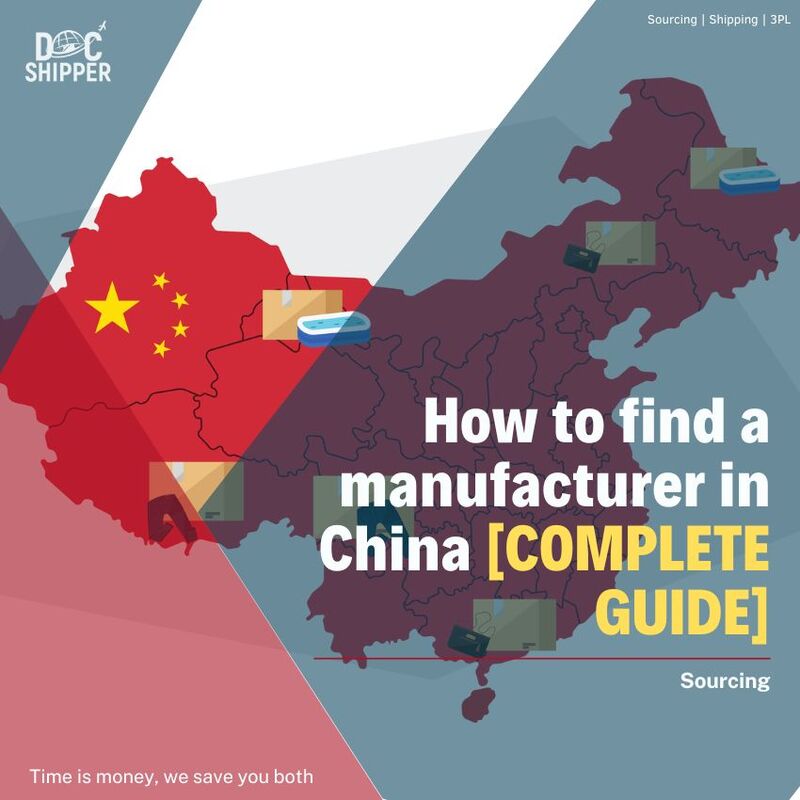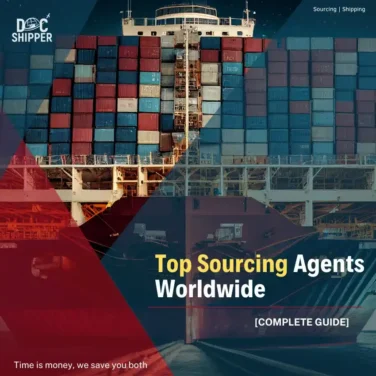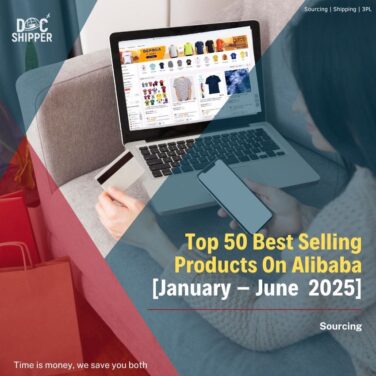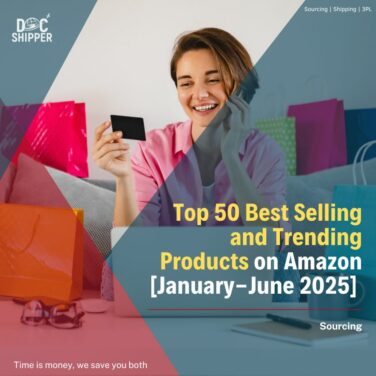In today’s interconnected global marketplace, China stands as a manufacturing giant, offering an extensive array of products and capabilities. For businesses seeking to bring their ideas to life, finding the right manufacturer in China can be a game-changer.
Whether you’re a startup entrepreneur looking to turn a concept into reality or an established company seeking cost-effective production solutions, navigating the intricate landscape of Chinese manufacturing is a crucial step.
This article will help you figure out how to find the best place to make your product in China. We’ll break it down step by step, so it’s easy to understand and follow. Whether you’re just starting or have been doing business for a while, finding the right manufacturer in China can be a big advantage for your business. So, let’s get started and explore the world of manufacturing in China.
5 Things you have to consider when choosing a Chinese manufacturer
When it comes to selecting the manufacturer, it’s crucial to make a careful decision that can have a significant impact, on the success of your business. Take these four factors into consideration:
1. Quality, Product Standards, and MOQ
Ensuring the quality of your product is absolutely essential. Assess the manufacturer’s quality control processes, certifications, and track record. Look for ISO certifications, industry-specific standards, and any relevant product certifications required in your market. Request samples to evaluate the product’s quality, materials used, and attention to detail. A manufacturer committed to delivering high-quality products will be open to quality control inspections and receptive, to making improvements based on your feedback.
2. Communication and Responsiveness
Effective communication plays a role when collaborating with a manufacturer from a culture and time zone. Evaluate their proficiency in English. How promptly they respond to your inquiries. A manufacturer who communicates clearly and promptly can help prevent misunderstandings and ensure that your requirements are accurately met. Clear communication also facilitates any changes, updates, or addressing issues that may arise during production.
3. Production Capacity and Facilities
Assess the manufacturer’s production capacity to ensure they can meet your order quantities and deadlines. Inquire about their production facilities, equipment, and technology. A well-equipped manufacturer with modern facilities is more likely to deliver consistent quality and handle large orders efficiently. Additionally, inquire about their current workload to ensure they have the bandwidth to prioritize your orders.
4. Reputation and References
Research the manufacturer’s reputation within the industry and among their clients. Online reviews, testimonials, and references from other businesses that have worked with them can provide valuable insights. Join industry forums or online communities to gather information and experiences shared by others who have dealt with the same manufacturer. A manufacturer with a positive reputation is more likely to be reliable and trustworthy.
5. Intellectual Property Protection

Protecting your intellectual property (IP) is crucial. Ensure the manufacturer respects your designs, trademarks, and proprietary information. A trustworthy manufacturer will be willing to sign a non-disclosure agreement (NDA) and respect your IP rights. Discuss IP protection measures and ensure they are included in your contractual agreement.
DocShipper Alert
DocShipper Alert: Sourcing products from China can sometimes be difficult with time-consuming steps, limited supplier choices, and unexpected shipping problems. But DocShipper is here to change all of that. We make the whole process much easier, saving you time and money. We have a big network of trusted suppliers, we’re good at managing shipping, and we can negotiate deals well. If you want us to handle your sourcing, just call us for free via WhatsApp, or fill out the form to contact us.
How to find a manufacturer in China?
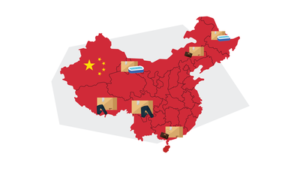
China’s role as the global manufacturing hub can be attributed to its abundant low-wage labor force, an efficient business ecosystem with a network of suppliers, and lax regulatory compliance. Favorable tax policies and competitive currency practices further attract businesses seeking cost-effective production. These factors collectively position China as “the world’s factory,” driving its manufacturing dominance on the global stage. Given these advantages, entrepreneurs are encouraged to seize the opportunity and explore sourcing from China to capitalize on these benefits for their business growth. Here are some ways to find product manufacturers in China:
Internet
In the modern landscape of business, the internet has revolutionized the way we connect and collaborate. This is especially evident in the process of finding manufacturers, where the virtual realm has opened doors to a multitude of opportunities in B2B online marketplaces, particularly in China such as Alibaba.com, Temu, 1688.com.
Here are the pros and cons of finding manufacturers through Internet:
Pros
Vast Selection: The online realm provides access to an extensive pool of manufacturers and suppliers in China. This diversity allows you to explore a wide range of options and tailor your search according to your specific requirements.
Comparative Analysis: The digital landscape enables easy and efficient comparison of prices, services, and product offerings. This empowers you to make informed decisions by evaluating various aspects of each potential manufacturer’s proposition.
Convenience: The convenience of conducting research and initiating communication online saves significant time and resources. You can inquire about products, request quotes, and establish connections without the need for in-person visits or extensive travel.
Global Reach: The internet transcends geographical barriers, enabling you to explore international manufacturing possibilities without the constraints of physical distance. This global reach opens doors to manufacturers that might not have been accessible otherwise.
Efficiency: The online approach streamlines the initial stages of the search process. You can swiftly identify a wide array of potential manufacturers, shortlist those that meet your criteria, and initiate discussions in a shorter timeframe compared to traditional methods.
Cons
Scam Risk: Engaging with manufacturers online, especially from regions like China, exposes businesses to the significant risk of encountering scams. Fraudulent entities can create convincing websites, profiles, and communications that appear genuine, making it challenging to distinguish between legitimate manufacturers and scammers.
Counterfeit Profiles: Scammers can create deceptive online profiles and websites that mimic legitimate manufacturers. These counterfeit platforms may display fabricated product portfolios, customer reviews, and contact information, leading businesses to unknowingly enter into deals with fraudulent parties.
Upfront Payments: Scammers often employ tactics that involve requesting upfront payments for products or services that they never intend to deliver. Businesses that fall for such schemes can suffer financial losses and disruptions in their supply chains, impacting their operations and profitability.
Reputation Damage: Falling victim to scams can have severe consequences of financial losses. Businesses may face reputational damage, as associating with fraudulent manufacturers can erode trust among customers, partners, and stakeholders.
Quality Concerns: Online transactions may limit your ability to assess the quality and authenticity of products before making a commitment. Scammers can exploit this gap, delivering substandard or counterfeit goods that do not meet your expectations.
DocShipper Info
DocShipper info : In a world filled with lots of wholesalers, finding the perfect match can be a challenge. But fear not, DocShipper is here to simplify the process! We handpick the top B2B wholesalers for you, saving you valuable time. You’ll get options that fit your requirements, whether it’s the quantity or type of products you need. And here’s the best part – our suppliers are trustworthy and genuinely want your business to thrive. If you’d like us to handle your sourcing, contact us or WhatsApp us now at no cost. We’re here to assist you!
Network references
In the global manufacturing arena, navigating with reliable references is crucial. When seeking manufacturers in China, leveraging your professional network for recommendations brings distinct advantages and disadvantages.
Here are the pros and cons of finding manufacturers through network references:
Pros
Reliability: Leveraging network references increases the likelihood of finding trustworthy manufacturers. Recommendations from trusted sources carry a higher level of reliability and credibility.
Verified Quality: Manufacturers referred by industry peers or business associates are more likely to have a proven track record of delivering quality products. This minimizes the risk of receiving substandard goods.
Efficient Screening: Recommendations from your network streamline the initial screening process. This saves time and effort that would otherwise be spent researching and vetting manufacturers independently.
Insightful Insights: Network referrals often come with valuable insights and firsthand experiences. This insider information can help you make well-informed decisions and navigate potential challenges.
Established Relationships: If a contact in your network has an existing relationship with the manufacturer, it can lead to smoother communication and collaboration, as well as potentially favorable terms.
Cons
Limited Options: Relying solely on network references might limit your choices to a narrow pool of manufacturers. This could result in missed opportunities with potentially better-suited partners.
Subjectivity: Recommendations are subjective and might not align perfectly with your specific requirements. What works well for one business might not work as effectively for another.
Dependency: Depending solely on network referrals might lead to overreliance on a few sources, making your manufacturer search vulnerable to changes in those relationships.
Bias and Interests: Referrals could be influenced by personal biases or vested interests. Recommendations might not always be impartial or aligned with your business needs.
Inaccurate Information: While references come from trusted sources, there’s still a possibility of misinformation or outdated experiences affecting your decision-making.
Trade shows
Trade shows serve as invaluable platforms for businesses looking to connect with wholesale suppliers, discover new products, and stay updated on industry trends. These events bring together manufacturers, distributors, and retailers, making them an ideal place to forge strong business relationships and source products at competitive prices.
Here are the pros and cons of finding manufacturers through trade shows:
Pros
Networking Opportunities: Trade shows provide a concentrated gathering of industry professionals, making it easier to connect with potential suppliers, distributors, and partners.
Product Inspection: You can physically inspect products, assess their quality, and even request samples, allowing for a more informed purchasing decision.
Industry Insights: Seminars and workshops at trade shows offer valuable insights into market trends and emerging technologies, helping you stay competitive and informed.
Face-to-Face Interaction: Meeting suppliers in person fosters trust and can lead to stronger, long-lasting business relationships.
Exclusive Promotions: Many suppliers offer special deals and discounts exclusively for trade show attendees, potentially saving you money on purchases.
Efficient Sourcing: Having multiple suppliers in one location streamlines the sourcing process, enabling you to compare products and negotiate terms efficiently.
Cons
Costs: Attending trade shows can be expensive, considering registration fees, travel, accommodation, and other related expenses. Small businesses with limited budgets may find this challenging.
Time-Consuming: Trade shows can be time-consuming, especially if they involve long-distance travel. This may disrupt your regular business operations.
Overwhelm: Large trade shows can be overwhelming due to the sheer number of exhibitors and attendees, making it challenging to focus on specific suppliers or products.
Limited Diversity: While trade shows offer a variety of suppliers, they may not encompass the entire market. You might miss out on smaller or niche suppliers who do not attend these events.
Follow-Up Efforts: Building relationships and securing deals often requires significant follow-up efforts after the trade show. This can be time-consuming and may not always yield immediate results.
Competition: Trade shows are competitive environments, and some suppliers may receive more attention than others. Standing out and getting the attention of desirable suppliers can be challenging.
This table gives some examples of the biggest trade shows where you can find reliable wholesale suppliers in China.
| Trade Show | Frequency | Scale | Exhibitors | Visitors | Benefits |
| Canton Fair (China Import and Export Fair) | Biannually in spring and autumn | Divided into three phases spanning 1.2 million square meters | Over 25,000 exhibitors | Around 200,000 buyers from 210+ countries and regions | Comprehensive showcase, face-to-face interactions, insights |
| Global Sources Exhibitions | Spring and fall | Encompassing electronics, gifts, home products, fashion, and more | Thousands of suppliers | Over 70,000 buyers from 150+ countries and regions | Direct sourcing, new product launches, industry connections |
| China International Industry Fair (CIIF) | Annually | Showcasing industrial equipment, manufacturing technology, and automation | Over 2,000 companies across 280,000 square meters | Approximately 170,000 attendees, including international visitors | Exposure to advanced manufacturing technologies |
| East China Fair (ECF) | Annually | Highlighting consumer goods and home products | More than 4,000 exhibitors | Over 25,000 professional buyers from 100+ countries | Sourcing platform for textiles, garments, household appliances |
| HKTDC Fairs (Hong Kong Trade Development Council) | Multiple fairs throughout the year | Encompassing electronics, fashion, gifts, and diverse industries | Thousands of suppliers across various sectors | Tens of thousands of international buyers | Networking opportunities, insights, direct interactions |
Sourcing agents
When navigating the intricate realm of manufacturing in China, sourcing agents emerge as trusted guides, bridging the gap between businesses and manufacturers. This approach offers a dedicated route to secure partnerships, and it comes with distinct advantages and potential drawbacks.
Here are the pros and cons of finding manufacturers through sourcing agents:
Pros
Local Expertise: Sourcing agents are equipped with an intimate understanding of the local market dynamics, industry trends, and cultural intricacies. This expertise streamlines the process, reducing the complexities of navigating the Chinese manufacturing landscape.
Efficiency: These agents are adept at supplier selection, conducting comprehensive due diligence to shortlist reliable manufacturers. This efficient screening process saves you precious time and resources, ensuring that you engage with trustworthy partners.
Skilled Negotiation: Sourcing agents wield adept negotiation skills, securing favorable terms, competitive pricing, and contractual agreements on your behalf. Their experience can result in cost savings and enhanced terms for your manufacturing projects.
Language and Communication: Overcoming language barriers is paramount in successful manufacturing collaborations. Sourcing agents serve as effective communicators, bridging the linguistic gap and ensuring seamless interaction between you and the manufacturer.
Quality Assurance: These professionals facilitate rigorous quality control checks, inspections, and audits to ensure that products meet your specified standards. This hands-on oversight minimizes the risk of subpar goods and aligns with your quality expectations.
Cons
Cost: Sourcing agents usually charge fees or commissions, which can increase your production costs. It’s important to evaluate whether the benefits outweigh the financial implications.
Misaligned Interests: Agents might prioritize their own interests over yours, pushing you towards manufacturers that offer higher commissions or incentives.
Transparency: Depending solely on sourcing agents could limit your direct insight into the manufacturing process, making it harder to address issues promptly.
Dependency: Overreliance on sourcing agents might create dependency, potentially hindering your ability to establish direct relationships with manufacturers.
Communication Challenges: While agents help with language barriers, miscommunications can still occur, impacting product specifications, timelines, and expectations.
DocShipper Tip
Docshipper Tip: If you want to become a professional at procurement, DocShipper is your solution! Our expert sourcing service is here to make your procurement journey smooth and successful. We can help you find the right suppliers and negotiate great deals. With our knowledge and experience, we’ve got what it takes to take your business to the next level. Let us be your procurement partner. Fill the form to contact us or WhatsApp us now for free!
How to Get a Product Manufactured in China?
Once you’ve located a Chinese manufacturer or supplier, you’ll typically need to think about the tasks and procedures involved in getting your product made in China, overseeing production, and getting it shipped to you. Here are the typical stages for identifying Chinese manufacturers:
5 Ways to Verify Authenticity Through Specific Queries

When confirming the legitimacy of the factory, you can explore the following queries to pose to your overseas suppliers:
-Does their factory name include terms like trading, industry, or technology?
-How diverse is their product range?
-Can you review their business license?
When engaging with the factory, it’s advisable to pose a distinct set of highly detailed inquiries. Here are some of the specific questions you may want to prioritize when communicating with the factory:
Who Have You Partnered With Previously?
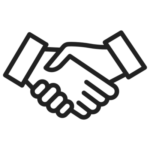
While reputable factories may refrain from revealing their previous clients, sellers can gain valuable insights into a factory’s quality standards by discerning the geographic locations of the majority of their customer companies. Factories that primarily serve the United States or Europe tend to maintain higher quality standards compared to those catering to markets in Asia or Africa.
Can You Provide Your Company’s Business License for Inspection?

Even if you’re not proficient in Chinese, you have the option to engage someone fluent in the language to examine and verify the company’s registration status with the Administration for Industry and Commerce in each Chinese province.
What is the Usual Minimum Order Quantity (MOQ) in Your Case?
While many factories prefer larger production volumes to maximize profits, they may be willing to consider lower minimum order quantities (MOQs) if they have confidence in your brand. It’s important to note that the initial MOQ figures provided by the factory may be negotiable.
On average, how much time does it take to create your samples?

Many individuals assume that producing a sample requires several weeks, but for straightforward apparel items such as shirts or hats, it can actually be accomplished in less than a week. However, the specific duration for creating samples can significantly vary depending on the product type.
What payment method do you typically use?

Typically, most factories follow a payment method of 30% upfront before commencing production and the remaining 70% before shipment. Essentially, you’re required to settle the full 100% of the product cost before taking physical possession of your order.
To ensure better quality control prior to shipment, you have the option to either visit the factory in person or enlist a quality control team for inspection. In the case of substantial orders, prudent international sellers often opt for quality control assessments before making the 70% balance payment.
Provide comprehensive product details to the factory
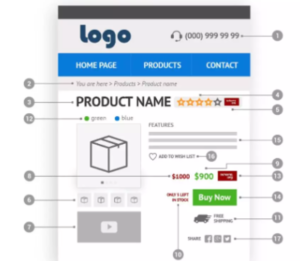
Typically, sellers have a clear understanding of the specific product specifications they intend to manufacture, which may include details such as colors, materials, and logos. When initiating discussions with the factory, they can explore the various options and features available for their product.
For instance, if you wish to customize a watch’s dial with a logo spanning the entire face, having a precise design in mind can save both time and expenses for both you and the factory. Factories prefer to avoid producing multiple samples due to any design oversights.
When engaging with Chinese factories, foreign sellers often begin with two crucial questions: “Is this a factory?” and “What is the cost?”
Subsequently, they proceed to calculate the precise manufacturing costs from multiple suppliers. Upon receiving quotations from various Chinese factories, it’s natural to wonder why the prices can differ significantly between manufacturers.
The variations in quotes from Chinese manufacturers can be attributed to several factors:
- Collaboration with Other Factories: Some suppliers may have partnerships with additional factories, influencing their pricing structure.
- Assumption of Unfamiliarity: Chinese suppliers might assume that you are not well-informed about the appropriate pricing for the product.
- Non-Expertise in the Product: Certain factories may not typically produce the specific product you’re requesting, leading to price differences.
- Quality Discrepancies: Differences in product quality, with some factories offering lower-quality items compared to industry standards.
To gain a comprehensive understanding of manufacturing costs, it’s advisable to gather quotations from at least three to five factories. This approach allows you to make informed decisions and select the most suitable option for your product.
Initiate Sample Request and Start Production
Foreign sellers typically request at least one sample for each product they plan to manufacture. Receiving samples from a potential Chinese supplier is the final opportunity for the buyer to make any necessary changes.
Given that it’s your product, you have the ultimate decision on whether to proceed with production or implement modifications. This is a crucial step, so ensure it’s well-considered!
Stay in Touch with the Factory and Monitor Production Progress
Once the sample is approved, formal production begins, which can take some time. To avoid production delays, keep these key points in mind:
- Complex Supply Chain: Understand that the factory may source various components of your product from different suppliers, so coordination is crucial.
- Shared Factory Resources: Remember, you’re not the factory’s only customer. Maintain active communication, build relationships, and broaden your focus beyond production matters.
Additionally, request regular photo updates to monitor production progress and stay on top of the schedule. This proactive approach ensures your production stays on track.
Ensure Quality Before Shipping Your Products
Chinese manufacturing is generally trustworthy and secure. However, to adhere to ISO standards, it’s essential to maintain consistent oversight of imported raw materials, conduct inspections throughout the production stages, and verify the goods’ quality after they’ve been manufactured.
Gain Insight into Quality Control Inspection Services in China
Product quality control inspection services play a vital role in identifying and rectifying product issues early to ensure that consumers receive authentic and reliable products. When dealing with overseas suppliers like those in China, many buyers turn to inspection agencies for help.
These agencies offer various inspection services to maintain product quality and authenticity. This is especially valuable when visiting the supplier’s location isn’t feasible due to distance. In such cases, inspection agencies step in to conduct thorough quality control checks on your behalf.
This flowchart serves as a concise representation of the steps involved in selecting product inspection services:
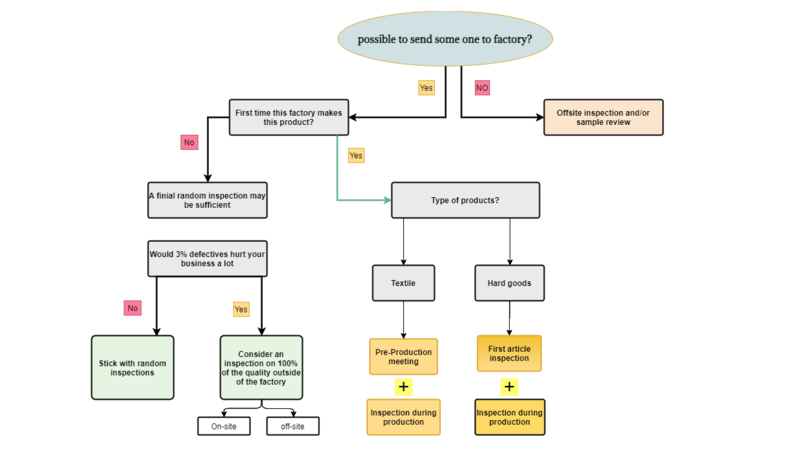
Source: Suppliya
Pick the Suitable Shipping Option through a Chinese Agent
While your Chinese manufacturers can assist in shipping your goods, it’s crucial to understand how to select the most cost-effective shipping methods.
Decide on Incoterms and Shipping Options
China offers three legitimate shipping methods: air freight, rail freight, and sea freight. In addition to that, you have to manage shipping risks by choosing the suitable incoterms. In case of loss or damage to transported goods, incoterms clearly define the buyer and the seller’s responsibilities in the transport chain.
DocShipper Tip
DocShipper Advice: Choosing the cheapest shipping method from China can be tricky, with numerous options and uncertainties. Don’t worry! DocShipper is here to simplify the process. With our expertise in international logistics and strong relationships with various carriers, we can help you select the most cost-effective shipping method for your needs. Trust us to guide you at every step of the shipping process from China. Save time and money by choosing DocShipper as your trusted partner. For more information, contact us now by filling out this form or just making a free WhatsApp call with ease.
How can DocShipper help you find a manufacturer to make your product China?
DocShipper is a global logistics and sourcing company with extensive experience in China. They offer a range of services designed to simplify the process of finding a manufacturer and getting your product to market. Here’s how DocShipper can help:
- Supplier Identification: DocShipper has an extensive network of trusted manufacturers across various industries. They can help you identify and connect with the right supplier for your specific needs.
- Quality Control: DocShipper offers quality control and inspection services to ensure that your products meet your specifications and quality standards.
- Logistics and Shipping: DocShipper handles the logistics and shipping aspects of your production, ensuring that your products are delivered to your desired location on time.
- Sourcing Materials: They can assist in sourcing the raw materials and components required for your product, helping you find cost-effective and reliable suppliers.
- Legal and Regulatory Compliance: DocShipper has a deep understanding of Chinese regulations and can help you navigate the legal aspects of manufacturing and importing your products.
- Transparent Communication: They bridge the language gap, facilitating clear and effective communication between you and your Chinese manufacturer.
DocShipper Alert
DocShipper Alert: When working with Chinese suppliers, be cautious, especially if you’re new to importing or have a unique product. Some companies may exploit your inexperience, even trying to copy your idea. Be careful when sharing sensitive information with unfamiliar suppliers. DocShipper can help. We conduct thorough checks and connect you with reliable, trustworthy suppliers. Contact us or just WhatsApp us for free now to learn more and protect your business.
FAQ | How to find manufacturer in China
Read more
Looking for more? These articles might interest you:
DocShipper info: Do you like our article today? For your business interest, you may like the following useful articles :
Need Help with Logistics or Sourcing ?
First, we secure the right products from the right suppliers at the right price by managing the sourcing process from start to finish. Then, we simplify your shipping experience - from pickup to final delivery - ensuring any product, anywhere, is delivered at highly competitive prices.


Fill the Form
Prefer email? Send us your inquiry, and we’ll get back to you as soon as possible.
Contact us





